Dec 23, 2024 – Dharma Q&A for Incheon International Airport Corporation Employees, Departure for Bhutan
Hello. Today, Sunim is giving a Dharma Q&A lecture for the employees of Incheon International Airport Corporation and departing for Bhutan.
After completing his morning practice and meditation, Sunim met with the Seoul lay Sangha at 7:30 AM in the Dharma hall on the third floor of the Jungto Social and Cultural Center. As Sunim is leaving for a 50-day overseas schedule starting today, everyone greeted him with three bows.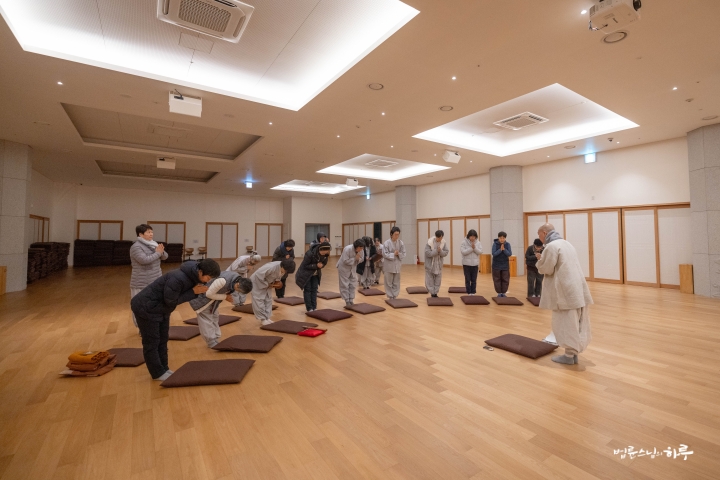
“Sunim, have a safe journey.”
Sunim then shared a few words with the Seoul lay Sangha.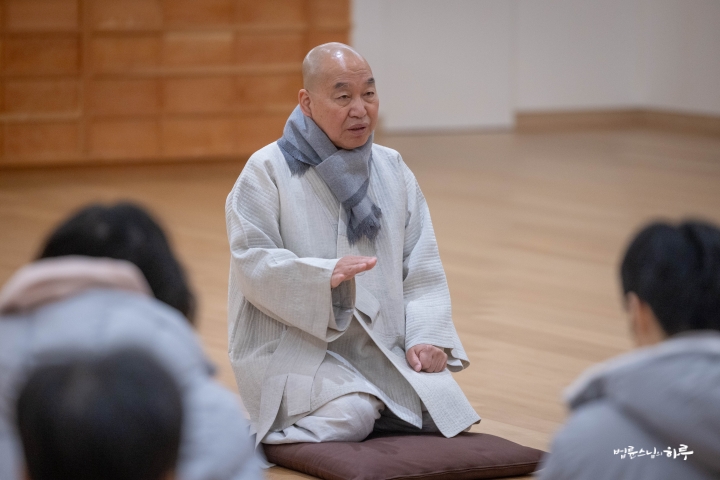
“I’m departing today and will return to Korea on February 15th. We will start the 100-day special practice together from February 16th. I hope you all go down to Bonghwa and wrap up the year well through meditation. After that, many people will go on the pilgrimage to India, so I think it will be February before everyone can return to their respective departments. Especially for departments involved in social activities centered around the Peace Foundation, it seems we need to keep a close eye on how society changes. Because if things go smoothly, that’s great, but if not, we may have more work to do. From February, many people will be coming to the center, so we need to discuss how to run the center. Please work together and prepare well. Now, I’ll be on my way.” 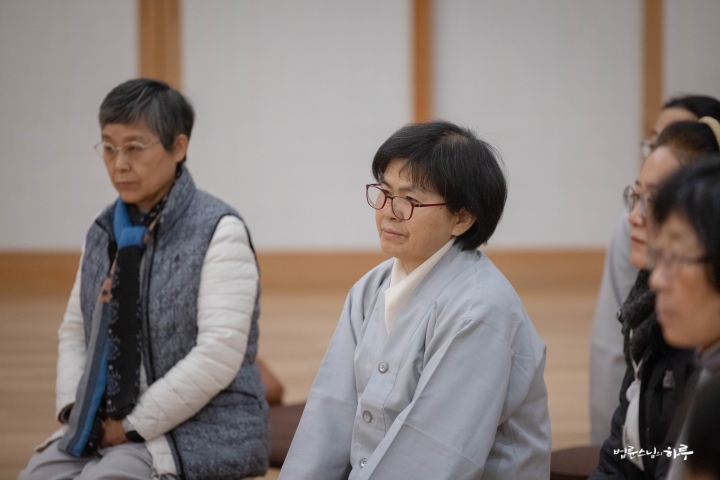
The Seoul lay Sangha members pledged to diligently practice in their respective positions and saw Sunim off to the entrance.
At 7:40 AM, Sunim departed from the Jungto Social and Cultural Center for Incheon International Airport. After a 1 hour and 20 minute drive, he arrived at Terminal 2 at 9:00 AM and checked in the luggage in advance.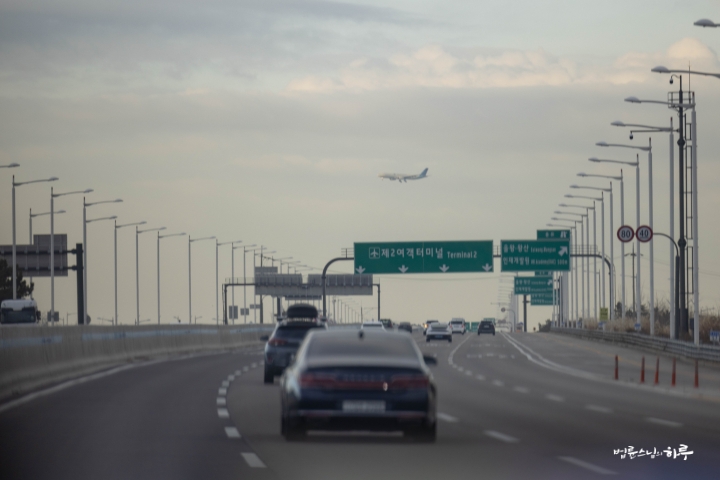
After completing the boarding procedures, Sunim moved to the government joint office of Incheon International Airport Corporation to give his lecture. Mr. Lee Hak-jae, the president of Incheon International Airport Corporation, called Sunim directly to apologize in advance for not being able to attend due to a sudden National Assembly schedule.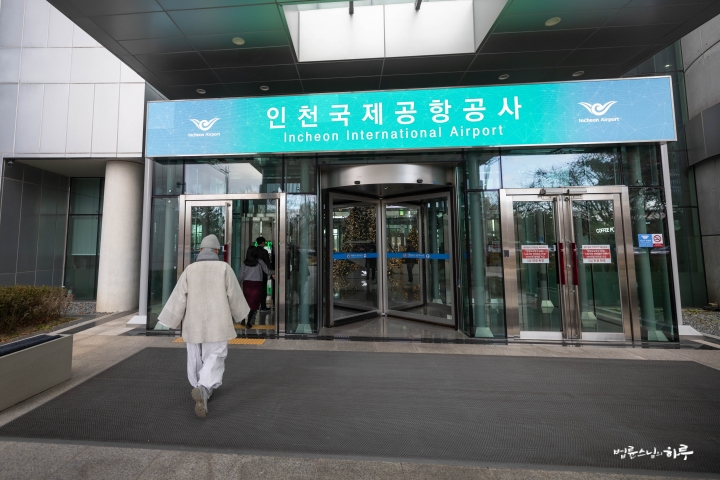
As Sunim got out of the car, the employees welcomed him warmly. They moved together to the reception room where Sunim had tea with the executives of Incheon International Airport Corporation. Vice President Kim Beom-ho and other executives, including the Infrastructure Director and Safety and Security Director, were all present.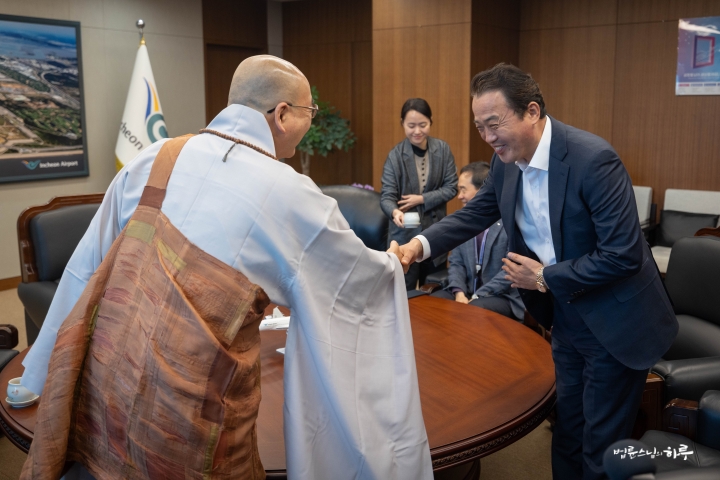
“Sunim, thank you for taking the time for our employees despite your busy schedule.”
“I use the airport often, so it’s only right that I should give back to the employees.”
The Vice President and executives asked Sunim about their concerns.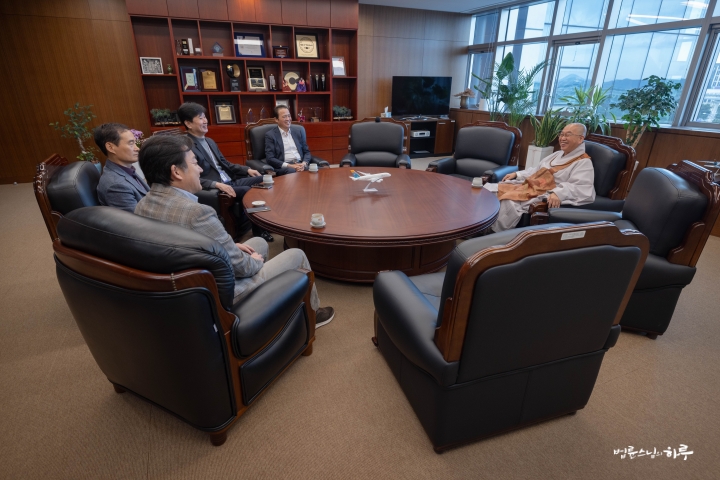
“The situation in our country is quite unsettled. Especially in our country, the partisanship is so severe that it seems a proper culture of debate can’t take place. How do you view the current political situation, Sunim? I think you might see it differently from us.”
Sunim smiled and answered.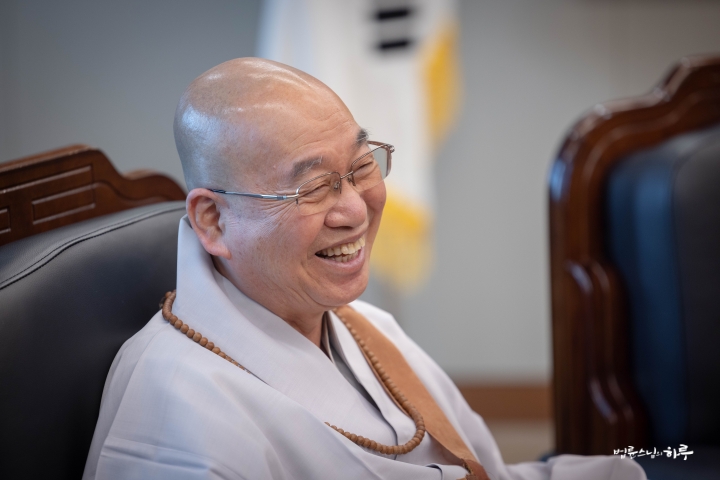
“It’s not just our country where the conflict between political factions is intensifying. It’s a global phenomenon. Even in the United States, 20 years ago, when I visited the Senate Foreign Relations Committee to discuss North Korean issues, even if a Republican senator was the chairman, they would invite Democratic staff members to listen to the explanation together. The same was true in the opposite case. These days, the opposition has become so severe that there are hardly any opportunities to talk together. So now I have to visit Republican and Democratic offices separately. I think the algorithm that shows related videos on YouTube might be intensifying this opposition, as people nowadays keep watching only the content they want to see. Germany and France are relatively politically stable countries, but both governments have faced votes of no confidence.
The pace of change is so fast that if we view the world with past perceptions, it’s bound to be very confusing. The world changes overnight. 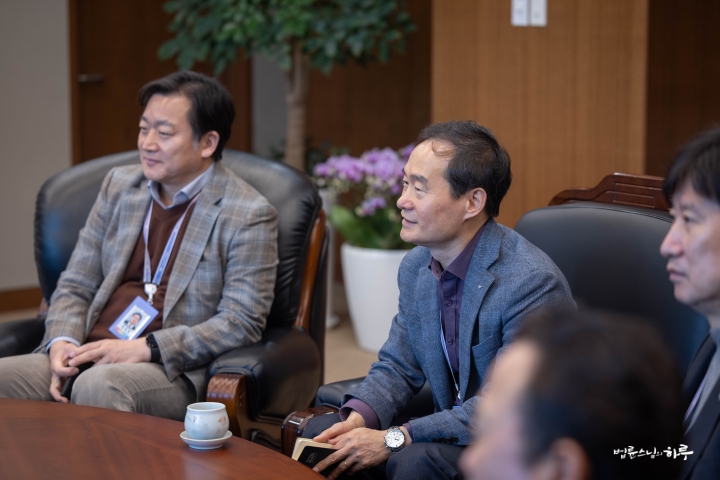
“We recently built a new school for 4,000 students in the earthquake-affected area near the Syria-Turkey border and attended its opening ceremony last October. At that time, the end of the Syrian civil war seemed uncertain. The northeastern region is inhabited by Kurds, the Turkish border area is controlled by rebels, the southern region is under Syrian government control, and part of Lebanon is held by rebels. Due to 12 years of civil war, some areas have had no basic education for children. Some children who couldn’t attend elementary school are now almost 20 years old. Not only were schools destroyed by the earthquake, but 500,000 refugee children had no access to education at all. I met with the interim government leader to discuss how to tackle illiteracy. Then, overnight, the civil war ended with a bloodless takeover. I received a message recently that instead of discussing school repairs, they now want to talk about how to rebuild the country. Most areas where people are starving or becoming illiterate are conflict zones. That’s why we are mainly involved in humanitarian aid activities in conflict areas.”
“The most unfortunate situation is that North Korea suffered severe flood damage last summer, causing great hardship for its people. Due to inter-Korean tensions, we can’t help them even though they’re right next door. Up until the COVID-19 pandemic, we were able to provide humanitarian aid, but now we can’t offer any support at all.”
“Thank you for your insightful words.”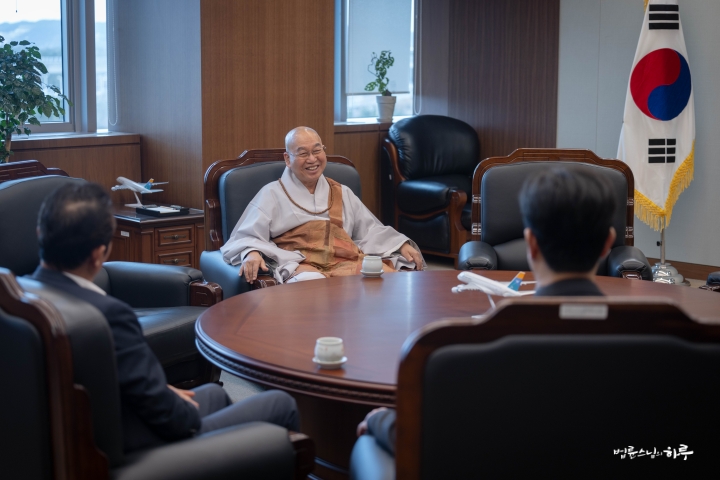
After 30 minutes of tea and conversation, it was time to start the lecture, so they moved together to the main auditorium.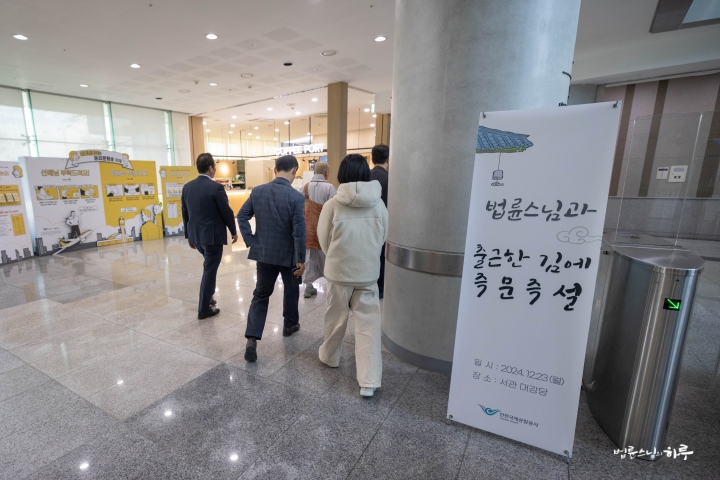
About 100 employees were already seated, ready to listen to the lecture as soon as they arrived at work. The title of today’s event was “Dharma Q&A on Your Way to Work.” Sunim took the stage amidst applause and cheers after being introduced by the host.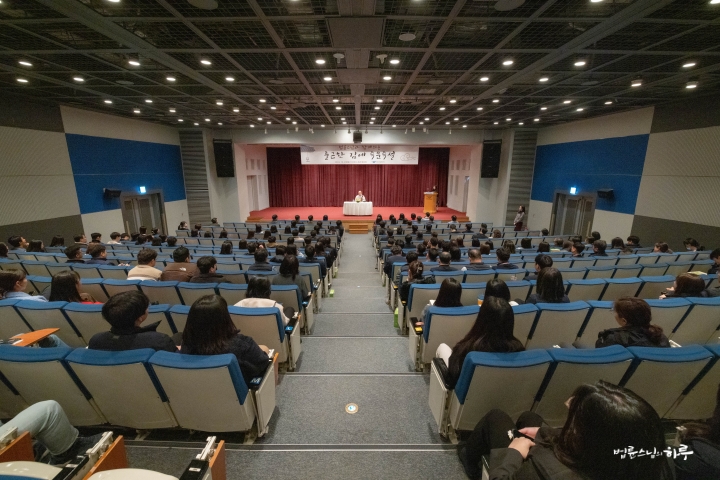
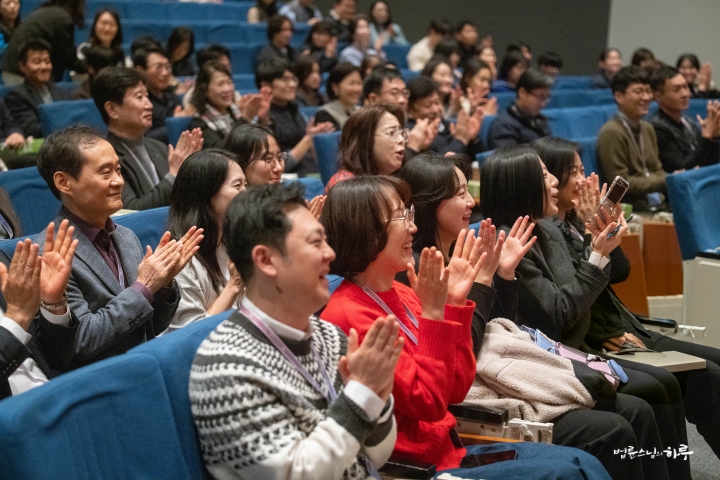
Sunim began with a greeting.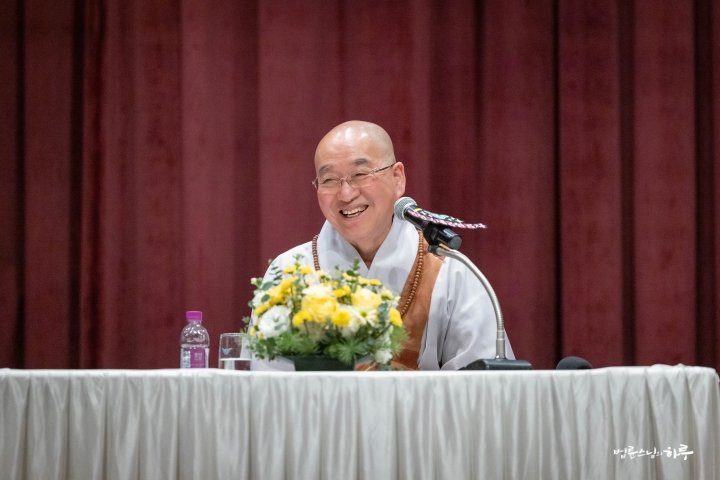
“Hello everyone, it’s nice to meet you. First, I’d like to apologize. Incheon International Airport Corporation had requested a lecture, but I didn’t have any available time in my schedule this year. However, when I mentioned I had some free time before my departure today, the preparation team was pleased, and this early morning lecture was arranged. It’s Monday, and I know you’re busy in the early morning hours. It would have been better if we could have scheduled this on a weekday afternoon, but unfortunately, this was the only option.
Last October, I invited the President of the Vietnamese Buddhist Sangha Council and his delegation to Korea. As they were all international VIPs, the President of Incheon International Airport Corporation personally welcomed them and hosted them in the VIP lounge. So, I felt somewhat indebted. That’s why I made an effort to schedule this lecture, even if it’s a bit rushed. Moreover, despite my frequent use of Incheon Airport, I hadn’t properly shown my appreciation to the staff. Through this opportunity today, if I can be of any help, I’ll make sure to have such occasions more often in the future, not just today.”
Everyone applauded with joy.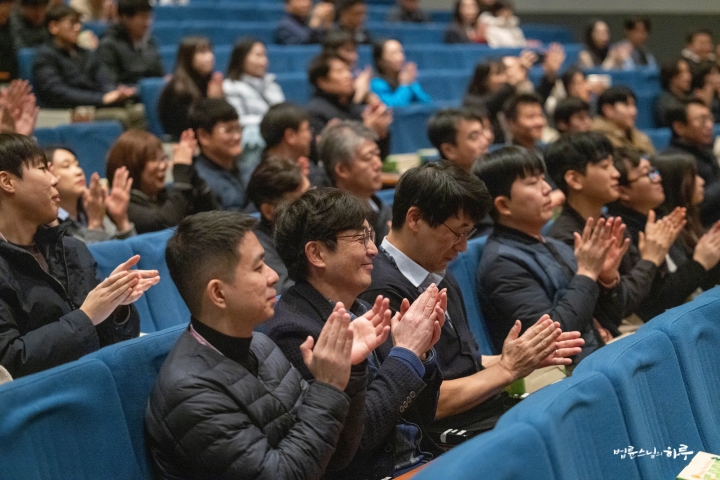
Then, those who had submitted questions in advance raised their hands one by one to engage in a dialogue with Sunim. Due to the flight departure time, the conversation lasted only an hour. Four people asked Sunim questions. One of them, feeling exhausted from work life, asked for Sunim’s advice on how to have peace of mind. Saying that even when they rest, they don’t feel truly rested.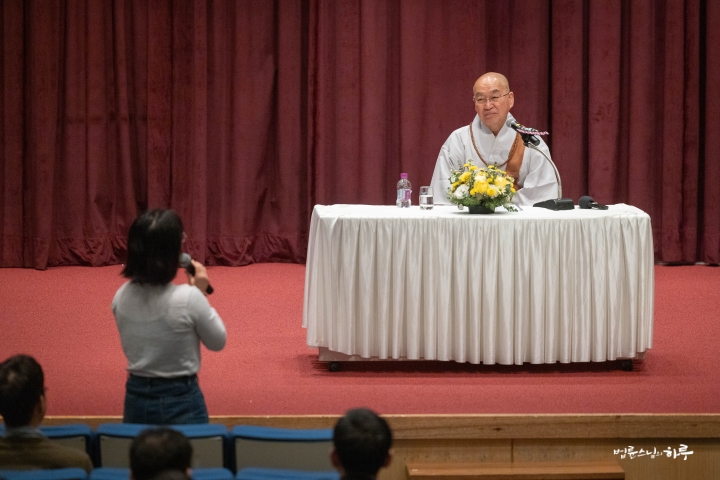
How Can We Forget Work Stress and Achieve True Rest?
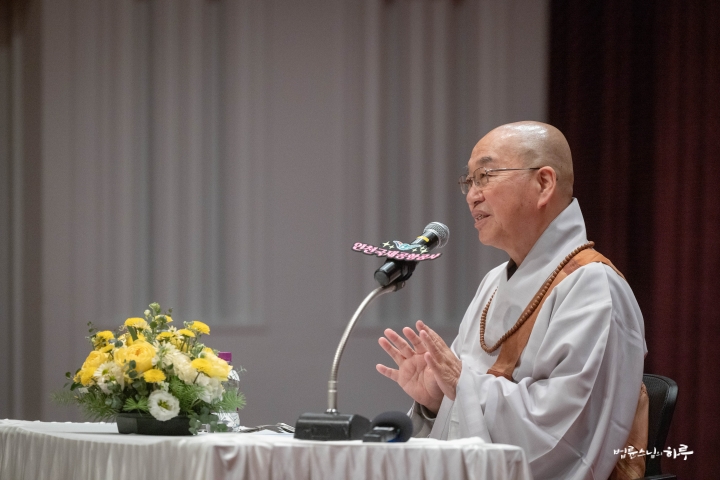
“There are two types of rest: physical rest and mental rest. Physical rest is recovering from a state of overwork. But why do we go hiking, cycling, or play golf on weekends when we’re physically overworked? It’s because we need mental rest rather than physical rest. These activities and games are ways to take mental breaks, but they don’t help with physical rest at all.
You can tell whether you’re in a healthy state or a fatigued state physically by simply sitting down and closing your eyes. If you sit quietly with your eyes closed and feel sleepy, it means you’re either sleep-deprived or fatigued. In other words, you can quickly check if your body is in an overworked state.
The best method for physical rest is meditation. Just lying down and sleeping doesn’t really help with fatigue relief. You still feel sleepy even after sleeping. Feeling drowsy unintentionally while sitting quietly is a physical need, but trying to sleep is following a desire. That’s why when you meditate and find yourself nodding off uncontrollably, this sleepiness completely disappears after just one day. After that, you won’t feel sleepy at all even when you sit quietly with your eyes closed. This can resolve all sleep deprivation issues. That’s why meditation is the best form of rest. 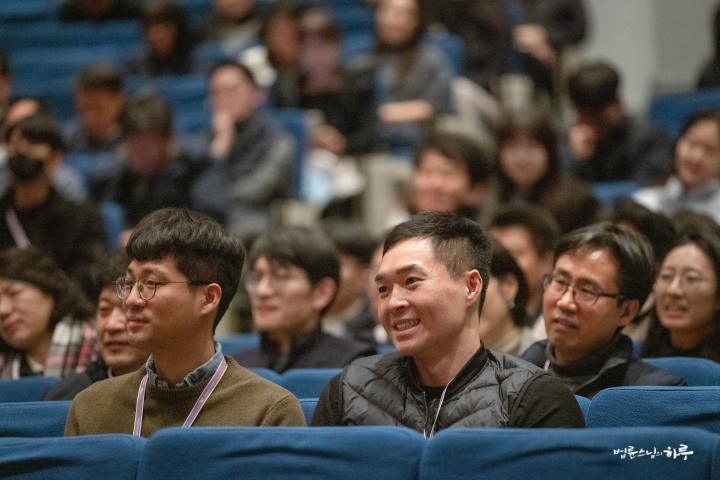
However, if you’re sitting still but constantly thinking in your head, such as “work should be done this way or that way,” you’re actually continuing mental labor despite being physically still. Especially when sitting still, thoughts tend to arise more than when you’re working. That’s why it’s important to focus on one thing. While you can’t prevent thoughts from arising, you should concentrate on your breath or a hwadu (Zen koan) without attaching meaning to the thoughts that arise. For example, it’s okay if thoughts of your mother or coffee come up, but if you start following a story like “Who did I have coffee with at that cafe back then?” you’re giving meaning to it and indulging in delusions. So, no matter what thoughts arise, you shouldn’t attach meaning to them and should only be aware of your breath. If you maintain this state of thoughts arising and disappearing while meditating for about 4 nights and 5 days, your physical fatigue will be completely relieved.
The best way to relieve mental stress is also through meditation. However, the most common method you use to relieve mental stress is through play. While work causes stress, play helps to relieve some mental stress. But if you play too intensely, you might end up more physically tired than when you work. That’s why “Monday blues” occur, making you drowsy when you go to work on Monday. Mental stress is largely due to psychological factors.
For example, let’s consider dancing at a discotheque. Professional dancers dance on stage, while many people who came to have fun dance below the stage. Let’s say the people dancing below the stage pay 100,000 won to dance, while the person dancing on stage receives 1,000,000 won for dancing. Usually, when you receive money for dancing, it’s called work, and when you pay money to dance, it’s called play. So, if you were to pay money to go to your company, it would become company play. (Laughter) 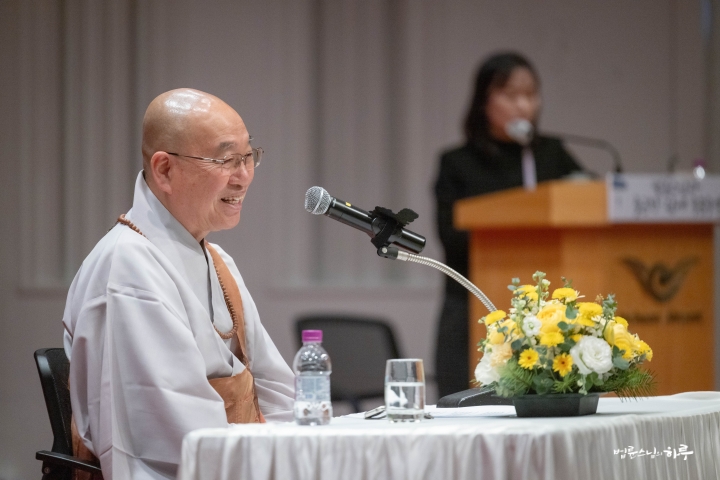
“Dancing is the same. However, when you pay to dance, it becomes play. When a singer receives money for singing, it becomes work, but when you go to a karaoke and pay to sing, it becomes play. This applies to everything. Why does this phenomenon occur? When you pay to dance or sing, is money the goal? Or are dancing and singing the goals?”
“Dancing and singing are the goals.”
“Yes, dancing and singing are the goals. So you’re directly pursuing your goals. But when someone receives money for dancing and singing, are dancing and singing the goals? Or is money the goal?”
“Money is the goal.”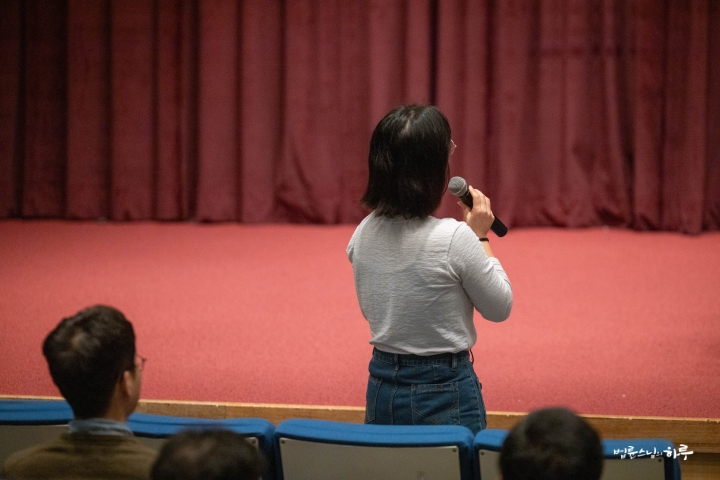
“That’s right. Because money is the goal, dancing and singing are merely used as means. That’s when we call dancing and singing work. You can live your life like play too. When you feel physical fatigue, you can rest. Mental stress can become play just by changing your perspective. Life is play. What do you think about this?
The reason I don’t receive money for certain things I do is because I want to live life like play. If I were to receive payment for giving this lecture today, I would be doing work. In that case, I would have to consider whether I’m being paid a lot or a little. If I were to stop people on the street and ask them to listen to my lecture for an hour, how many would willingly agree? If I offered to pay them 30,000 won to sit for an hour, a few might gather. But you’ve all gathered here without receiving any money, so this is a benefit for me. Because I think this way, this lecture becomes play for me.
To summarize and return to the question, physical rest is achieved by resting. The best way to rest is through meditation. Mental rest comes from treating work like play. For work to become play, you either pay to do it or do it without receiving payment. When you adopt this attitude towards life, work becomes play and rest.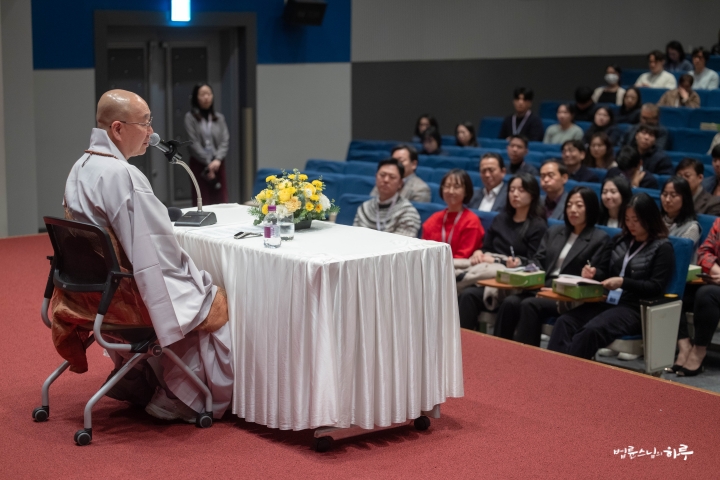
Let me share my story. Since I conduct many Dharma Q&A sessions, many of you express gratitude for the advice you receive from me. By listening to your stories, I gain insights into the various concerns and thoughts people have, and how situations actually unfold. The reason I have such a deep understanding of life is because you share with me thousands of life’s dilemmas that you can’t even imagine. As a result, I don’t have many rigid thoughts like “This must be done” or “This should never be done.” This is because after hearing all the various struggles people go through, I realize there’s nothing humans won’t do. Therefore, everything that happens is possible. Something impossible cannot occur. Things happen because they are likely to happen.
Also, when I help others, I feel a sense of fulfilment. When I receive help from someone, I feel joy, but it gradually fades over time. However, the sense of fulfilment I feel when I help someone lasts much longer. Raising a child is challenging, but it’s rewarding, isn’t it? Life isn’t just about actions that earn money. You can use your talents in many ways without receiving payment. This isn’t a sacrifice on your part. When you help others without expecting compensation, you psychologically develop a sense of fulfilment, your shoulders straighten, and you gain self-esteem. 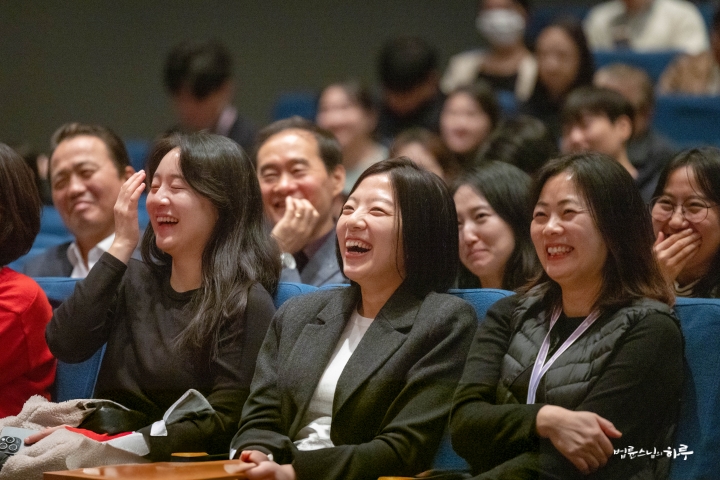
When you receive help from someone, you may feel good, but you might also feel timid when you’re in front of that person. If someone helps you regularly, you always feel unconfident in their presence. So receiving help isn’t always a good thing. However, people often just want to receive help, which leads them to become more withdrawn.
There’s a reason why many people say, “You’re not truly an adult until you’ve had and raised a child.” When raising a child, you give endlessly without expecting anything in return. Giving makes you an adult, receiving makes you a child; giving makes you the host, receiving makes you the guest. Although it may seem like you’re losing out by giving, it actually builds your self-esteem. This isn’t to say that you need to give to be a great person. It’s just how human psychology works. Just as there are principles in the material world and in metabolism, there are principles that govern human psychology. When you act with an understanding of these principles, your intentions and results tend to align more closely. When you act without understanding these principles, your intentions and results may not match, leading to disappointment or regret.
Even when I conduct Dharma Q&A sessions, I’m simply following the principles of how the mind works. Many of you ask, “Sunim, how do you know so much about everything in such detail?” Whether it’s about marital relationships, romantic relationships, parent-child relationships, friendships, or business relationships, they’re all human relationships in the broader sense. From the perspective of examining how psychology works in human relationships, they all follow the same principles. Of course, there are slight differences when you look at the specifics of each type of relationship. For example, romantic relationships involve feelings of attraction towards someone. 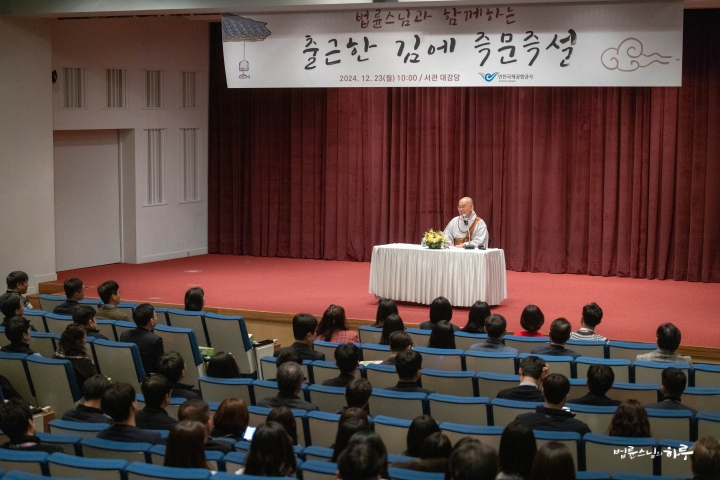
What I’d like to say is that it would be good if you could live your life with a bit of research. If a child doesn’t listen, don’t just scold them saying, “Why on earth don’t you listen?” Instead, observe and study how the child reacts to your actions. If your husband has an affair, don’t just say, “How could you have an affair?” Rather, try to research, “Why did this suddenly happen after 20 years of marriage?” If studying your husband alone isn’t enough, even try interviewing the other woman. Then you can understand, “Ah, this is how human psychology works, causing such incidents.”
By studying your child as you raise them, you could write a book about teenagers. By deeply researching a man who had an affair, you could write a book analyzing the causes of conflicts in middle-aged couples. Of course, one case is not enough. There could be exceptions, so if you study a few more cases, you can understand the psychology that can occur even if the marital relationship is not bad. All conflicts are just manifestations of hidden psychology that have been revealed through some trigger.
Life is not something special. With a little research, you can understand why the other person reacts in a certain way. For example, you can accept that “This person’s intention is not like that, it’s just their nature.” First, grasp the situation, then identify the cause, fix what needs to be fixed, accept what needs to be accepted, and if it’s impossible to resolve, end the relationship. It’s not about ending relationships because of emotions, but objectively observing that “This might be difficult for us to adjust to each other.” So you’re not parting as enemies, but because living together would harm both parties. Then you can part ways saying “Take care” and bowing three times to each other. Isn’t it nice to part like this? I suggest trying to live with this perspective. Before talking about past lives, fortune-telling, or compatibility, if you just observe and research a little first, you can live without major difficulties.”
“Thank you.”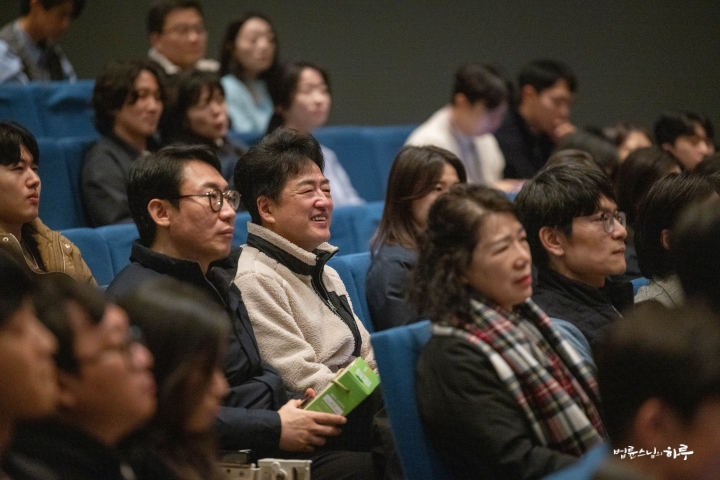
The questions continued.
In work life, we often have to constantly adjust to others’ moods. As time passes, I’m not sure what emotions I’m feeling. How can I find myself in this situation?
I’m raising two children, and their habits really don’t improve. I’m wondering if I should force them to change or leave them be. What should I do when children cross the line?
What’s the way to cherish myself? What do you do for yourself, Sunim? How should I talk to myself to know what I want?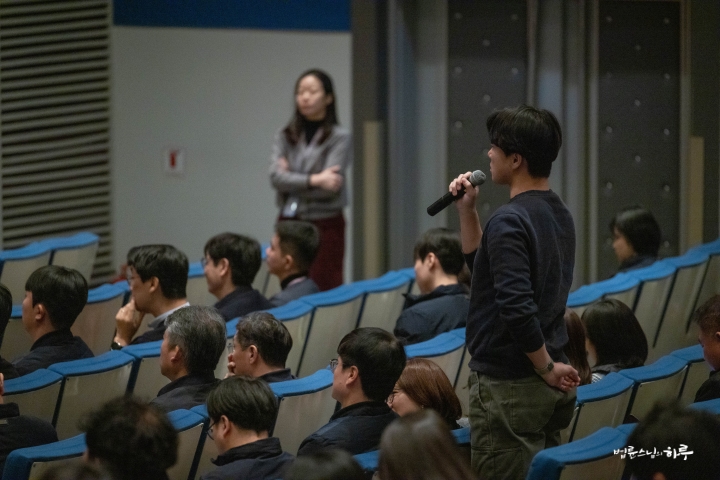
As they conversed, the promised hour had already passed. Although everyone seemed to want to hear more from Sunim, it was time for the flight to depart, regrettably concluding the lecture.
After taking a commemorative photo with the executives of Incheon International Airport Corporation under the banner, Sunim left the auditorium.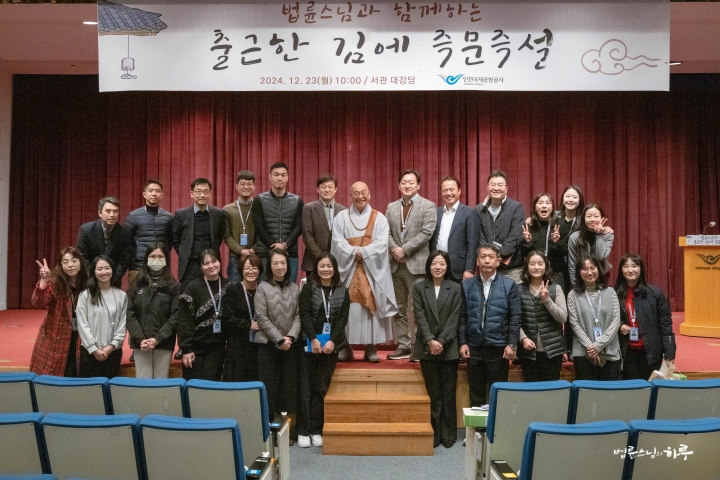
Sunim got back in the car and headed to Terminal 2 to board the plane. An Incheon International Airport Corporation employee personally guided Sunim to the terminal.
“With the completion of Incheon Airport’s 3rd and 4th phase projects this year, Terminal 2 has been completed, and it has now become a large-scale airport capable of accommodating 100 million people.”
After getting out of the car and greeting the staff, Sunim headed to the boarding gate. The Haengja from the practice team also said goodbye to Sunim.
“Sunim, have a safe trip.”
“Yes. Everyone, have a good winter retreat.” 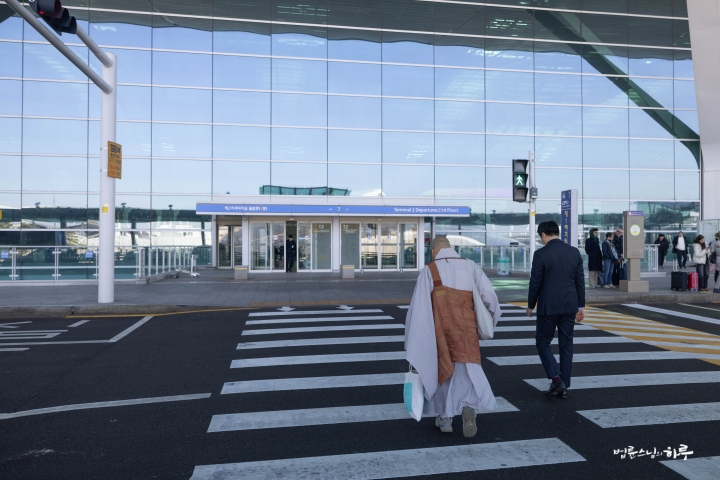
Guided by an airport employee, Sunim headed straight to the boarding gate.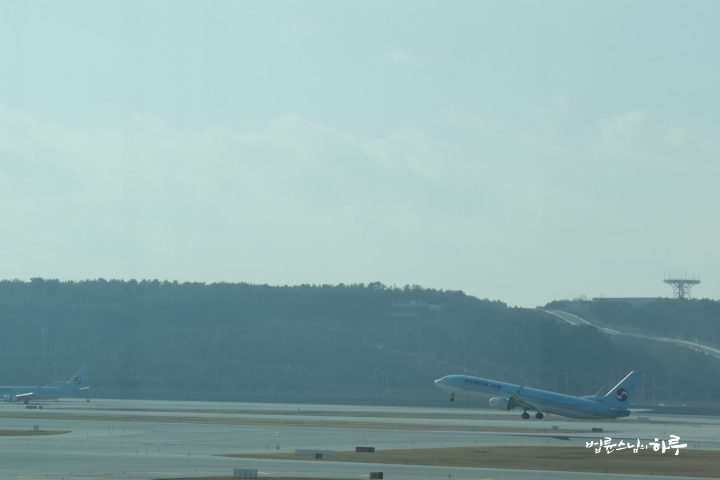
After arriving at the departure lounge and organizing luggage, boarding soon began. Today, due to the airline’s aircraft inspection, the plane departed 15 minutes late. Sunim fell asleep while waiting for the plane to take off.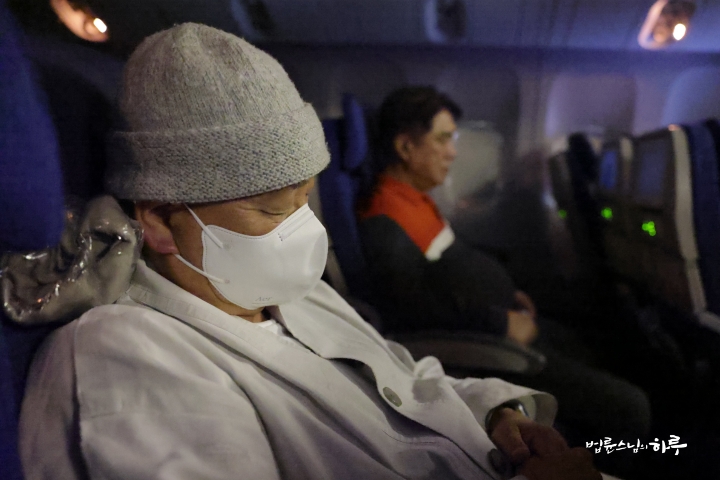
It’s a long distance from Incheon Airport to New Delhi Airport, taking 9 hours. Not only was the departure late, but the weather conditions along the route were not good, so the arrival time in Delhi was delayed by about 1 hour and 40 minutes. Sunim was scheduled to arrive at 6:20 PM, but arrived in Delhi at 8:00 PM and retrieved the luggage. While retrieving the luggage, he met Jungto Society members who had travelled on the same flight. They were on their way to Bodhgaya.
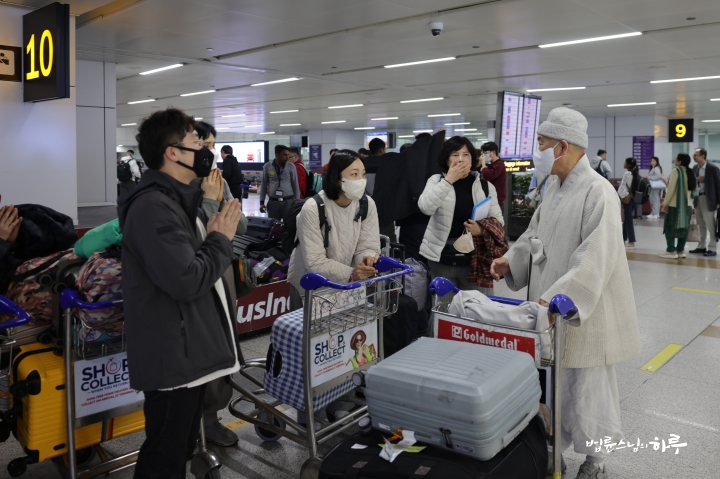
Sunim greeted the Jungto Society members warmly and left the Delhi Airport departure lounge at 8:40 PM.
It was decided Sunim will stay at a lodging near Delhi Airport tonight. After arriving at the lodging at 9:10 PM, he concluded the day’s schedule.
Tomorrow, Sunim plans to depart from Delhi Airport in India, arrive at Paro Airport in Bhutan, and then travel to Trongsa all day.




